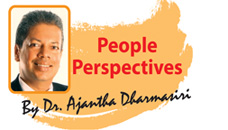Discovering 'deep-smarts'
 Being
smart makes you confident. Being 'deep-smart' makes you move beyond in
unleashing the hidden potential. We say working smart is better than
working hard. Being
smart makes you confident. Being 'deep-smart' makes you move beyond in
unleashing the hidden potential. We say working smart is better than
working hard.
Among the Oxford dictionary descriptions of smartness (of a person),
clean, tidy, and well dressed, attractively neat and stylish, bright and
fresh in appearance are the prominent ones. It also highlights having or
showing quick-witted intelligence. It is clearly associated with
success.
In moving from smartness to 'deep-smartness', one key component
emerges clearly. That is knowledge gained through experience. Way back
in the early nineties, a Japanese Professor of Management, Ikujiro
Nonaka called this 'tacit knowledge'. According to him, tacit knowledge
comes through experience and is hard to transfer from one to another.
It reminds me of traditional physicians we had in rural areas in the
past, where they treat patients through experience. In contrast his
golaya or student carries a book jotting down every prescription, and
observing every move of his teacher.
What the student will acquire is known as 'explicit knowledge' or
'coded knowledge'. Essentially, it refers to knowledge available in
documents, manuals, organisations in either hard or soft forms. The
challenge today is to transfer the 'tacit' form of knowledge to
'explicit' form.
Tacit knowledge
 Tacit knowledge is all about 'know-how' in doing things smartly. I
remember running a soap powder packing plant as a young engineer. There
was a sachet-filling machine that caused a lot of problems. My typical
approach was to use the troubleshooting manual and go step by step,
following instructions such as "if X happens then do Y". I was in fact
using my 'explicit' knowledge. Tacit knowledge is all about 'know-how' in doing things smartly. I
remember running a soap powder packing plant as a young engineer. There
was a sachet-filling machine that caused a lot of problems. My typical
approach was to use the troubleshooting manual and go step by step,
following instructions such as "if X happens then do Y". I was in fact
using my 'explicit' knowledge.
We had an elderly technician who had several decades of service in
the same department. He used to approach me and say, the problem lies
with a particular valve inside. He could sense it from the faulty noise
of the machine. How did he know to such a precise extent? He was simply
using his 'tacit' knowledge. Now we are getting closer to our core
discussion. 'Deep-smarts' are the ones full of 'tacit' knowledge.
The term 'deep-smart' first appeared in a book titled, 'Deep smarts:
Experience based Wisdom' in 1995. The co-authors were Prof. Dorothy
Leonard of Harvard Business School and her husband Prof. Walter Swap of
Tufts University. Based on years of research, the couple identified a
breed of people in society full of wisdom gained though experience.
Let's see how they describe 'deep-smarts'.
Familiar pattern
"Have you ever seen a colleague make a swift, seemingly intuitive
decision - one that turned out to be wise - and you wondered, "How did
she do that?" Or perhaps you yourself, drawing on years of experience
and hard-won judgment, recognise a familiar pattern in a sea of
information and quickly diagnose it. We call the practice-based wisdom
used in such situations 'deep smarts'.
As they elaborate, deep smarts are not philosophical - it is not
wisdom in that sense, but it is as close to wisdom as business gets.
You see it in the manager who understands when and how to move into a
new international market, the executive who knows what kind of talk to
give when her organisation is in crisis, the technician who can track a
product failure back to an interaction between independently produced
elements. In all these instances, what is common is the demonstration of
'tacit knowledge'.
"These are people whose knowledge would be hard to purchase in the
open market, says Prof. Leonard. Their insight is based on 'know-how'
more than on 'know-what', and it comprises a system view and expertise
in individual areas.
There is an organisational challenge here. Because deep smarts are
experienced based and often context specific, they can't be produced
overnight or readily imported into an organisation. It takes years for a
person to develop them. They can be taught, however, with the right
techniques.
As the authors of the book say, every organisation relies on the deep
smarts of key members to compete, progress, and innovate. People with
deep smarts have an almost uncanny ability to size up a complex
situation and consider its system-wide implications and yet dive
intelligently into the details when necessary. Their smarts may be
technical, managerial, or both.
One example of deep-smart from the US is about a veteran scientist.
He realises that his company is about to lose a profitable Defence
Department contract because of basic flaws in software and hardware
design in a missile prototype. Drawing on 20 years of experience and
speaking without notes, he spends several hours with the project team,
laying out in detail all the needed changes. It takes several hundred
people 18 months to implement the design changes, but the company wins a
contract that still delivers profits years later.
While many types of 'learning by doing' exist, research by Professors
Leonard and Swap identified several types of guided experience that were
used to re-create knowledge of deep-smarts.
Guided practice
Guided practice is by far the most familiar way of learning by doing.
Repetition of behaviour, actions, or mental routines until we are
skilled.
This is how we learn to play the piano, conduct a business meeting,
or sell a new product. However, we learn much more quickly if we have
competent feedback. Even professional athletes have coaches.
We need deep-smarts to solve unprecedented complex issues in
organisations, industries and nations. Cutting-edge technology should be
blended with experience-based wisdom to provide sustainable solutions.
We Sri Lankans can do much more if this clear awareness can be propelled
into concrete action.
The writer is the Acting Director of the Postgraduate Institute of
Management. He also serves as an Adjunct Professor in the Division of
Management and Entrepreneurship, Price College of Business, University
of Oklahoma,USA. |

